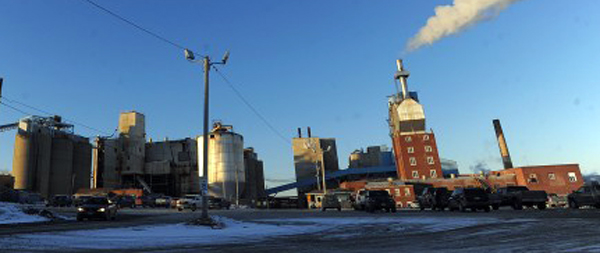
| Archive/Subscribe | TAPPI.org | Advertise | TAPPI Press Catalog | October 2014 |
Lincoln P&T to "Manage Way Through" Rising Winter Energy Costs
Lincoln Paper and Tissue, Lincoln, Maine, USA, should ride out the skyrocketing electricity costs that state officials expect will hit homeowners and businesses this winter, co-owner Keith Van Scotter said recently in a report by the Bangor Daily News, Bangor, Maine. One of the Lincoln Lakes region’s largest employers, Lincoln Paper’s connection to Bangor Natural Gas Co.’s new $7.5 million pipeline into town is expected to go online in two weeks. The tissue producer is also working to make its steam turbine electricity generator more efficient, Van Scotter said.
"It is a big deal. I think we will be able manage our way through it," Van Scotter said of the 130% cost increase predicted for this winter by the Maine Public Utilities Commission.
The commission predicted the highest monthly price for standard-offer electricity since 2008 will come in January. That’s when Central Maine Power’s standard-offer rate is expected to jump from 6 cents per kwh to 15 cents per kwh for medium-sized commercial and industrial customers, ranging from grocery stores to small saw and paper mills.
 "Paper mills such as the one in Lincoln are typically among the state’s large-sized commercial and industrial customers, who buy electricity on a day-to-day basis. Those customers will see electrical costs spike twice as high as normal for winter this year," said Patrick Woodcock, director of the state’s energy office. Van Scotter agreed.
The winter electricity cost spike "impacts everybody. We saw it last year," Van Scotter said in the article. "We buy electricity on a day-to-day basis. We actually saw this (a January cost increase) last year and we expect it to happen again this year. There were some days where it more than doubled. It was ridiculous. We expect that to happen and we are preparing for it."
For a typical business customer, the electricity supply portion of their monthly bill will increase from $870 per month in September to more than $2,000 per month in January. Prices for residential customers who take standard-offer service are fixed for one year, and will not change until March 2015. That rate has not yet been established, officials remarked.
Van Scotter, whose company buys its electricity wholesale, expects total energy costs will decline for his 200-worker tissue mill because no longer will it be paying for natural gas to be trucked to the facility, where it is burned in tissue driers. Bangor Gas’ metering substation, which allows the high-pressure gas on its pipeline to be routed into Lincoln Paper’s gas network, was completed about two weeks ago.
The natural-gas cost "is much lower this way than via truck," said Van Scotter, who declined to give exact figures. "Regardless of what the price of gas is itself, our delivery costs will decline."
He pointed out Gov. Paul LePage’s administration has worked to increase natural-gas pipeline capacity in Maine but has been hobbled by the lack of cooperation from other states such as Massachusetts, through which most New England natural-gas pipelines must go, and from the federal government.
"The fact is, we have very competitively priced electricity and natural gas for nine months out of the year, but as every business knows, you can’t shut down for three months," Woodcock said. "We are very close to having the world’s very best natural gas reserves. Unfortunately, the region (New England) has not followed Maine’s leadership in building a natural gas infrastructure to supply our businesses and employers."
Despite the expected December 1 shutdown of the Verso Paper mill in Bucksport—the third mill closure in Maine so far this year, creating the cumulative loss of more than 1,000 paper mill jobs—Van Scotter is bullish on Lincoln Paper and Tissue’s chances of continuing to manufacture. The mill makes a variety of tissue napkins and party supplies, medical tissue products, and occasionally toilet paper—markets that are actually continuing to slowly increase, despite growing international competition among tissue producers.
The Lincoln mill produced paper until an explosion at its recovery boiler in November 2013 forced the layoff of 200 workers in December. Van Scotter called the natural-gas pipeline connection "just another step in improving our overall competitive situation" in the aftermath of the incident. Van Scotter noted that he didn’t foresee any increases to the company’s workforce, layoffs, or short-term shutdowns in the near future. The company might lose a few positions through attrition, however, due to energy-cost savings, he said.
"We have orders and are running. I would say that we are going to continue to get better. I think we are going to stay roughly about the same size and capacity as we are right now. We worked hard this year in becoming more efficient as a stand-alone tissue producer and we are beginning to see the benefits of those efforts."
|

